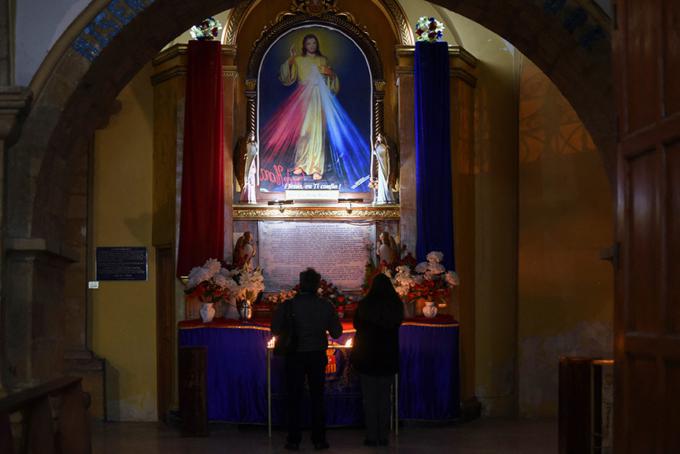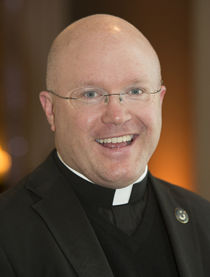
Faith
When Jesus was asked about how many are saved -- and therefore how many go to hell -- he didn't respond with a number, or a percentage, or with a full or null set. Rather, he said, "Strive to enter through the narrow gate."

Landry
When my siblings and I were very young and incorrigibly misbehaving, my mother, as a last-ditch effort to get us to listen, would occasionally pick up the rotary phone and inform us that she was calling "Mr. Meaney" to come to get us in his big car and cart us away.
She would carry on credible one-way conversations with the imaginary sadist, explain to him our delicts, ask details concerning the fearsome backseat of his terror-mobile, and agree with him about the length and severity of our detention.
With creativity evocative of Stephen King and Oscar-worthy acting, my mother would invariably get the four of us begging for mercy and resolving never to repeat our infractions. She was always able to persuade the barbarous Mr. Meaney to let us off each time with a stern warning, while committing to call him back immediately if we didn't keep our end of the plea bargain.
I couldn't stop thinking about the fictitious Mr. Meaney after a recent papal interview. When Fabio Fazio of Italy's Channel 9 asked Pope Francis on Jan. 14 how he understands hell in the context of divine mercy, the Holy Father replied with words that captured international headlines: "It's difficult to imagine it. What I would say is not a dogma of faith but my personal thought: I like to think hell is empty; I hope it is."
The Holy Father is not the first to hope that no one will end up eternally in hell. Bishop Robert Barron, Hans Urs von Balthasar, Sts. Teresa Benedicta of the Cross, Catherine of Siena, Teresa of Avila, Gregory of Nyssa, Clement of Alexandria, and Maximus the Confessor all have expressed, in one way or another, a similar hope, as did Origen.
It's certainly not heretical to have this hope, while it is to believe with certainty that hell is vacant ("universalism" was condemned by the Council of Constantinople in 543). In contrast to canonizations in which the Church proclaims someone in heaven through the determination of a particular saint's heroic virtue and through miracles solicited through the saint's intercession, the Church has never formally pronounced anyone in particular in hell, not even Judas Iscariot. While the "Catechism of the Church" affirms the "existence of hell and its eternity" (1035) and states that "those who die in mortal sin" go there, it also affirms that "in hope, the Church prays for 'all men to be saved'" (1821, citing 1 Tim 2:4).
Those who hope in this way interpret various passages of Sacred Scripture as reasonable justifications for it -- most notably St. Paul's expression just cited, that God "desires all to be saved and to come to the knowledge of the truth." Similarly, they focus on the power of Christ's death, resurrection and divine mercy and cite his words, "When I am lifted up from the earth, I will draw all people to myself" (Jn 12:32), and "I did not come to condemn the world but to save the world (Jn 12:47).
The vast majority of popes, ecumenical councils, saints, fathers and doctors of the Church, however, have given far more attention to the many words Jesus pronounces about the reality of Hell and the unmistakable impression he gives that people in fact end up there.
Jesus compared hell to a blazing furnace, an unquenchable fire, and a worm that doesn't die (Mt 13:42; Mk 9:43, Mk 9:48). He said we can make choices that can cause us to lose both body and soul in hell, exclude us from the banquet of the Kingdom, and lead to God's saying to us, "I never knew you" (Mt 10:28; Mt 22:13; Mt 7:23) He states that some "children of the kingdom" will be cast into the outer darkness, where there will be wailing and gnashing of teeth (Mt 8:12). In two parables, he communicates that while the kingdom seeks to draw everyone in, not everyone is fit for it (Mt 13:24-30; 13:47-50). He gives a parable of judgment in which he says he "will" say to those who have refused to nourish, dress, welcome and care for others, "Depart from Me, you accursed, into the eternal fire prepared for the devil and his angels" (Mt 25:41).
While not a snapshot of the end of the journey, Jesus says that there are far more people on the "broad way that leads to perdition" than the "narrow road that leads to life" (Mt 7:13-14) And even if the Church has never formally pronounced Judas in hell, Jesus stated that it was "better for him never to have been born" and that "none of [the apostles] was lost, except the son of perdition" (Mk 14:21; Jn 17:12).
If Jesus said all of this -- and more -- while knowing that hell would be unoccupied, he would have basically been doing the same thing my mom did with her stories about Mr. Meaney: speaking about a fearsome place of punishment and exile while knowing that Gehenna was literally an empty threat.
Such an image of Jesus engaging in psych ops and Dantesque fiction simply does not cohere with the one who identified himself as "The Truth" and declared he "came into the world to testify to the truth" (Jn 14:6; 18:37).
Those who dare to hope that hell will be eternally uninhabited often do so because they cannot fathom how a God full of compassion, slow to anger, and rich in kindness could ever set up an eternal, infernal dungeon in which He mercilessly punishes his beloved creatures. How could he ever refuse the merits of his passion to anyone for whom he gave his life?
Jesus, indeed, affirms that he had come into the world to save not condemn it, but added, "The one who rejects Me and does not receive My word has a judge, and on the last day the Word that I have spoken will serve as judge" (Jn 12:47). Those who reject Jesus' words of eternal life, walk in the darkness instead of the light, and fail to live by faith and enter the kingdom, become their own judges by the way they respond to the truth God has revealed.
"There are only two kinds of people in the end," C.S. Lewis famously wrote in "The Great Divorce." "Those who say to God, 'Thy will be done,' and those to whom God says, in the end, 'Thy will be done.' All that are in hell choose it." Hell exists not despite God's love but precisely because of it, in order to honor the desires of those who don't want to live in loving communion with Him and others. That's why the "Catechism" calls hell the state of "definitive self-exclusion from communion with God and the blessed" (1033). It is a tragic possibility of human freedom for those who, by choosing sin and persevering in it, separate themselves from God and others. There are some at the end who turn to Jesus like the Good Thief. There are also those who respond to him like the bandit on Jesus' left.
When Christ last century revealed the depth of his divine mercy to St. Faustina -- private revelations that the Church finds credible and devotionally follows in the novena from Good Friday through Divine Mercy Sunday -- Jesus himself spoke to her about hell and gave her several visions. While he stated that he "wants souls to come to know him first as King of mercy" ("Diary" 378), he said that we must take advantage -- not take for granted -- that divine gift.
"If my death has not convinced you of my life," he told her, "What will? [Some] use my graces to offend me. ... They do not wish to hear my call [to mercy], but proceed into the abyss of hell. ... God though I am, I cannot help such a soul because it scorns Me; having a free will, it can spurn Me or love Me" (580).
After St. Faustina was shown a vision of hell and witnessed the particular sufferings of those there, she testified, "I am writing this at the command of God, so that no soul may find an excuse by saying there is no hell, or that nobody has ever been there, and so no one can say what it is like. I, Sister Faustina, by the order of God, have visited the abysses of hell so that I might tell souls about it and testify to its existence." She added, "Most of the souls there are those who disbelieved that there is a hell" (742).
No faithful follower of Jesus of course ever wants anyone to end up in hell. We want Jesus' work of salvation to be efficacious, not refused. But refusing salvation is a radical capacity of human freedom. Just as it would have been senseless for Truth incarnate to speak about damnation so often and concretely if going there were just theoretical possibility -- essentially just to "scare the hell out of" his people across the centuries -- so it is imprudent and evangelically dangerous for admired Church leaders to second guess Jesus' words and speculate publicly about the improbability that no one in all of history would ever die in mortal sin and definitive self-exclusion.
Such problematic musings don't call people to conversion but complacency.
When Jesus was asked about how many are saved -- and therefore how many go to hell -- he didn't respond with a number, or a percentage, or with a full or null set. Rather, he said, "Strive to enter through the narrow gate."
As the Church celebrates during Holy Week and Easter the mysteries of our redemption, we would all do well faithfully to echo Jesus' wisdom and, with his grace, follow urgently and perseveringly that path.
- Father Landry is a priest of the Diocese of Fall River who is national chaplain to Aid to the Church in Need USA, a Papal Missionary of Mercy and a Missionary of the Eucharist for the US Bishops.
Recent articles in the Faith & Family section
-
On the Camino: Jentillaks and jazzMark T. Valley
-
From the Eternal CityArchbishop Richard G. Henning
-
Sometimes, a Hero wears a Cape and a VeilMaureen Crowley Heil
-
Fire of loveScott Hahn
-
Scripture Reflection for May 4, 2025, Third Sunday of EasterFather Joshua J. Whitfield























